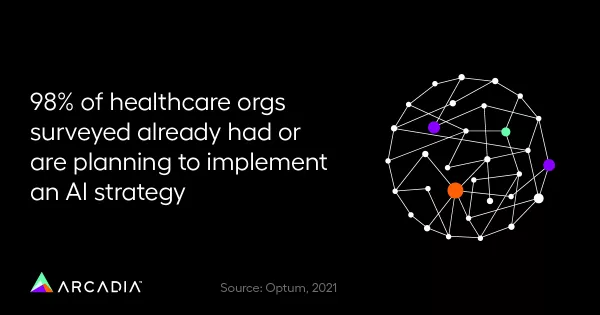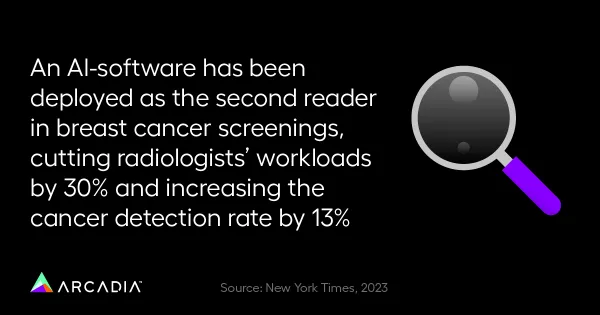ChatGPT in healthcare: evolution, revolution, or devolution?
Exploring AI in healthcare and physician settings
In recent years, artificial intelligence (AI) has made significant strides in healthcare. The integration of AI technologies has the potential to revolutionize the way healthcare professionals deliver patient care, improve medical decision-making, and enhance healthcare outcomes.
In fact, more healthcare organizations are adopting AI for everyday usage. According to Optum, 98% of organizations surveyed already had or are planning to implement an AI strategy.

A recently popular AI tool, ChatGPT, has garnered both skepticism and excitement among healthcare providers and researchers alike. We addressed this topic in a Byte-Sized Booth Talk at HIMSS, which features Senior VP of Marketing Jasmine Gee and Chief Medical Officer Dr. Rich Parker. In this discussion, they cover:
- The emergence of Chat GPT in healthcare
- Possible applications in medical settings
- Skepticism often associated with new technologies in healthcare
Historical perspective: Embracing new technologies in medicine
Before delving into the potential of ChatGPT in healthcare, it's important to acknowledge the historical pattern of skepticism and excitement accompanying technological advancements in medicine. Throughout history, innovative approaches that initially faced doubt eventually became integral parts of medical practice.
Dr. Rich, Chief Medical Officer at Arcadia, provides examples such as bloodletting and electronic prescribing, both of which were initially met with skepticism but are now widely accepted practices. Likewise, the emergence of ChatGPT in healthcare elicits similar mixed emotions — skepticism and excitement.
In this Byte-Size Booth Talk, Dr. Rich acknowledges the potential of this technology to transform mundane tasks in medicine, such as taking patient histories and generating differential diagnoses. ChatGPT can ask patients relevant questions and offer a list of potential diagnoses based on symptoms, thereby assisting healthcare professionals in making informed decisions.
Unveiling the potential: Real-life patient examples with ChatGPT
To better understand the capabilities of ChatGPT, Jasmine and Dr. Rich Parker explore a few real-life patient scenarios that showcase how this technology can assist in clinical decision-making.
In the first case, a 45-year-old female presents with severe chest pain, shortness of breath, and coughing up blood. ChatGPT generates a differential diagnosis, including acute coronary syndrome, pulmonary embolism, pneumonia, gastroesophageal reflux, pericarditis, and aortic dissection.
By considering the patient's recent travel history, ChatGPT suggests infectious causes such as COVID-19, tuberculosis, influenza, and others. Dr. Rich confirms the accuracy of the differential diagnosis generated by ChatGPT, indicating its potential value as a diagnostic tool.
The second case involves a 50-year-old man experiencing unawareness of food or spit on his face. ChatGPT identifies potential causes such as stroke, traumatic brain injury, brain tumor, Alzheimer's disease, Parkinson's disease, and other neurological conditions.
Although ChatGPT does not provide the exact diagnosis of facial onset sensory motor neuropathy, a rare neurological degenerative brain illness, it offers an extensive list of possibilities. Dr. Rich acknowledges the usefulness of ChatGPT's differential diagnosis, indicating its value in medical education and decision support.
Another case addresses the challenge of managing non-compliant diabetic patients with uncontrolled blood sugar. ChatGPT suggests strategies such as patient education, simplified medication regimens, regular follow-up, involving family and caregivers, and considering mental health support. Dr. Rich appreciates these reasonable suggestions, emphasizing the importance of working with patients to find acceptable and effective solutions.
Shaping the future: AI’s impact on healthcare
As healthcare professionals embrace the potential of AI and large language models like ChatGPT, several key considerations emerge. While AI technologies can assist in prompt generation of accurate diagnoses and provide decision support, they cannot replace the essential qualities of human interaction and empathy.
Dr. Rich emphasizes the importance of clinicians providing empathetic care, which AI lacks, especially in areas such as hospice care. Moreover, the integration of AI in healthcare allows clinicians to work at the top of their licenses by automating mundane tasks and enabling them to focus on more complex and critical aspects of patient care.
While AI in healthcare is still in its early stages, it has the potential to transform the medical industry and provide more efficient and accurate diagnoses. According to the New York Times, an AI software has been deployed as the second reader in breast cancer screenings, increasing the cancer detection rate by 13%.

However, it is important to note that AI should not replace doctors but should be used as a tool to aid in the diagnosis and treatment of patients.
As AI continues to develop, it is likely that we will see even more innovative uses in healthcare. It has the potential to revolutionize healthcare by improving efficiency, reducing healthcare costs, and increasing patient outcomes.
Dr. Rick Parker states, “While ChatGPT has limitations in predicting rare diseases, it can still be an effective tool in aiding physicians in the diagnosis and treatment of patients. As AI continues to develop, it will be exciting to see what other innovative uses it will have in the healthcare industry.”
Learn more in episode 11 of Vitals: Digital trends and AI in healthcare.
